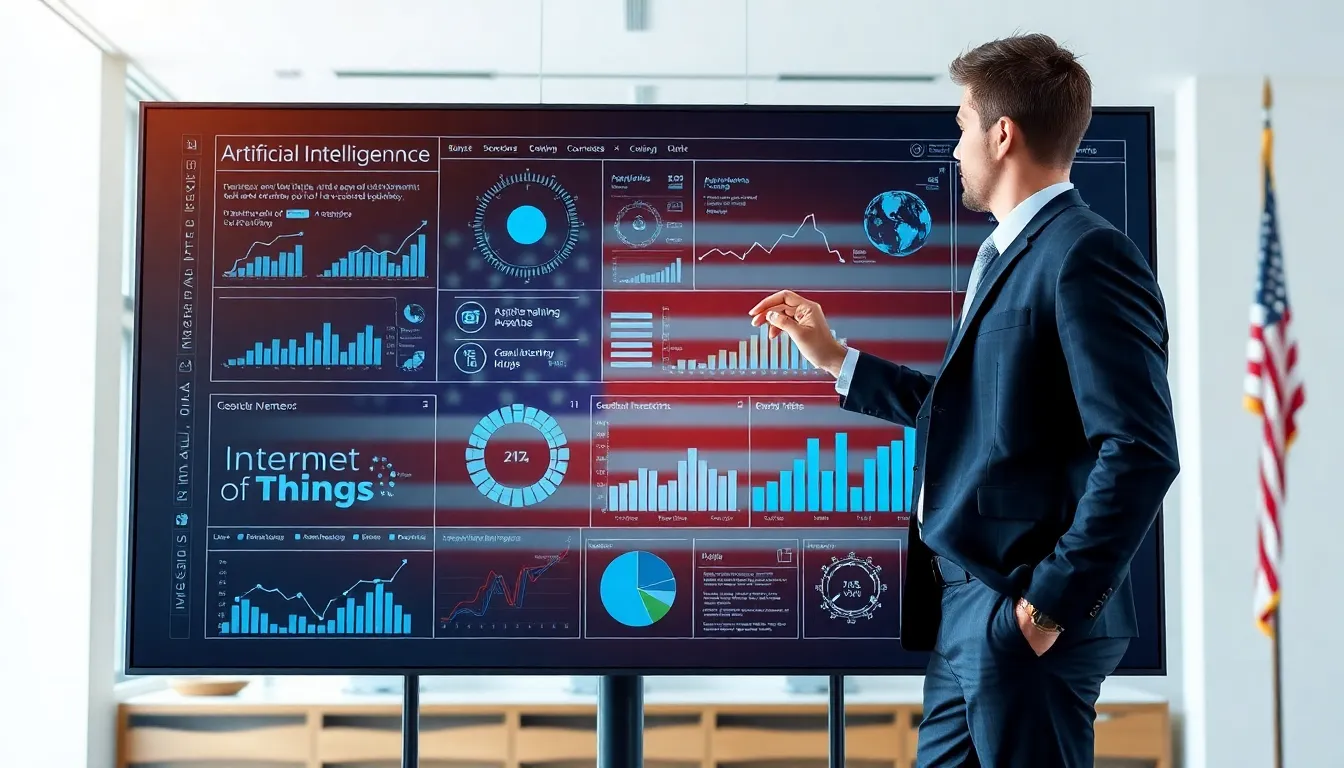In today’s fast-paced world, digital technology is reshaping how we live, work, and interact. From artificial intelligence to the Internet of Things, these trends are not just buzzwords; they’re transforming industries and everyday life. Keeping up with these innovations is crucial for businesses and individuals alike.
As digital tech continues to evolve, understanding its implications can provide a competitive edge. Companies leveraging these trends can enhance efficiency, improve customer experiences, and drive growth. This article delves into the latest digital tech trends, offering insights into what’s shaping our future and how to harness these advancements for success.
Table of Contents
ToggleOverview of Digital Tech Trends
Digital tech trends shape industries, redefine consumer behaviors, and foster innovative solutions. Key trends include:
- Artificial Intelligence (AI): AI drives automation, enhances data analysis, and personalizes customer interactions. Businesses leverage AI algorithms for decision-making and improving operational efficiency.
- Internet of Things (IoT): IoT connects devices, enabling real-time data exchange. Smart home technology, wearables, and industrial IoT applications streamline processes and enhance user experiences.
- Blockchain Technology: Blockchain provides secure, transparent transactions. Organizations utilize this technology for supply chain management, financial services, and identity verification.
- Cloud Computing: Cloud adoption accelerates as businesses prioritize scalability and flexibility. Services like SaaS, IaaS, and PaaS offer cost-effective solutions for data storage and application deployment.
- 5G Technology: 5G improves network speed and connectivity. Enhanced mobile experiences and IoT functionality become standard as 5G networks expand.
- Augmented Reality (AR) and Virtual Reality (VR): AR and VR create immersive experiences across sectors such as gaming, education, and training. These technologies enable new ways of engagement and learning.
- Cybersecurity Innovations: As digital threats escalate, innovative cybersecurity measures gain importance. Organizations implement advanced technologies like AI-driven threat detection and blockchain for improved security.
Staying abreast of these trends empowers businesses and individuals. Understanding their implications encourages informed decisions that leverage digital advancements for growth and efficiency.
Emerging Technologies

Emerging technologies reshape various industries, driving innovation and efficiency. Key areas include Artificial Intelligence and the Internet of Things, both playing crucial roles in digital transformation.
Artificial Intelligence
Artificial Intelligence (AI) streamlines processes by automating tasks, improving decision-making, and enhancing data analysis. AI algorithms analyze vast datasets, identifying patterns that humans may overlook. Industries utilize AI for predictive analytics, personalized marketing, and customer support via chatbots. According to McKinsey, 70% of organizations are adopting AI in some form, indicating its growing significance across sectors.
Internet of Things
The Internet of Things (IoT) connects millions of devices, facilitating real-time data collection and analysis. Smart devices monitor and control systems, enhancing operational efficiency in environments such as healthcare and manufacturing. IoT technology supports predictive maintenance, leading to reduced costs and downtime. Statista estimates that more than 75 billion IoT devices will be in use by 2025, showcasing the rapid expansion of interconnected systems.
Impact on Industries
Digital technology transforms various industries by enhancing efficiency, improving customer experiences, and creating new business opportunities. Key sectors impacted include healthcare and finance.
Healthcare
Digital technologies streamline operations and improve patient care in healthcare. AI analyzes patient data for faster diagnosis, while IoT devices monitor vital signs in real-time. Telemedicine expands access to health services, allowing for remote consultations. According to the American Hospital Association, 76% of hospitals use telehealth technologies, enabling timely medical interventions. Blockchain enhances data security and interoperability, ensuring secure sharing of patient records. These advancements boost efficiency in hospitals and clinics, leading to better health outcomes.
Finance
Digital technology revolutionizes the finance industry, fostering faster transactions and improved customer experiences. AI algorithms predict market trends, enhancing investment decisions. Mobile banking apps provide convenient access to financial services, with a report from Statista indicating that over 1.7 billion people use mobile banking worldwide. Blockchain technology facilitates secure and transparent transactions, reducing fraud risk. Fintech startups leverage these technologies to offer innovative solutions, disrupting traditional banking models. Such advancements bolster operational efficiency and create personalized financial products.
Consumer Behavior Shifts
Consumer behavior is evolving rapidly in response to digital technology advancements. Increased connectivity and accessibility shape customers’ expectations and shopping habits.
Remote Work Adoption
Remote work adoption has surged, driven by technological innovations. Surveys indicate that 74% of companies plan to permanently shift to more remote work, altering work-life balance perceptions. Employees seek flexibility, valuing time and efficiency over traditional office settings. Businesses now prioritize collaboration tools like video conferencing and project management software, enhancing communication and productivity. This shift increases reliance on digital resources, creating demand for improved cybersecurity measures to protect sensitive data.
E-Commerce Growth
E-commerce growth represents a fundamental shift in shopping behavior, with online sales projected to reach $6.39 trillion by 2024. The pandemic accelerated this transition as 51% of shoppers prefer online purchases for convenience and safety. Mobile shopping gains prominence, as over 72% of consumers report using smartphones for purchasing decisions. Retailers adapt by optimizing websites and investing in user-friendly interfaces, ensuring seamless navigation and checkout processes. Personalization techniques, powered by AI, increasingly cater to consumer preferences, enhancing overall shopping experiences.
Future Predictions
Emerging digital tech trends predict significant advancements in various industries. Businesses and individuals that adapt to these changes gain competitive advantages.
- AI Advancements: AI technology is expected to become more intuitive and integrated into daily operations. Anticipating a 50% increase in AI capabilities by 2027, organizations will utilize AI for more complex tasks, including natural language processing and advanced analytics.
- IoT Proliferation: IoT device usage is set to grow substantially. More than 100 billion devices could connect by 2030, enhancing automation in sectors like manufacturing and smart cities, leading to optimized resource management.
- Blockchain Expansion: Blockchain technology will likely see broader adoption across various industries. By 2025, an estimated 30% of global transactions may incorporate blockchain for secure, transparent dealings, especially in finance and supply chains.
- Cloud Computing Growth: Cloud services will continue evolving. Forecasts indicate a 22% growth in global cloud spending by 2024, as businesses prioritize flexibility and efficiency in data management.
- 5G Connectivity: The expansion of 5G technology will enhance mobile applications and IoT functionality. Projections suggest 5G networks will cover 65% of the global population by 2025, facilitating faster data transfer and improved user experiences.
- AR and VR Integration: AR and VR technologies are expected to enhance training and marketing strategies. The market for AR and VR is anticipated to grow to $300 billion by 2024, providing immersive experiences that promote customer engagement.
- Cybersecurity Focus: As digital threats increase, cybersecurity innovations will gain importance. Investments in cybersecurity solutions could reach $350 billion by 2026, reflecting growing concerns about data privacy and security.
Such predictions indicate that continuous technological evolution shapes industries and consumer behavior. Businesses that embrace these trends can enhance operations and provide superior user experiences.
Digital tech trends are not just reshaping industries; they’re redefining everyday life. As advancements like AI and IoT become more integrated into daily operations, businesses and individuals alike must adapt to thrive in this evolving landscape. Embracing these innovations can lead to enhanced efficiency and improved customer experiences.
The future promises even more growth in technologies like blockchain and 5G, which will further transform how people interact with digital platforms. Staying informed and agile in response to these trends is crucial for leveraging opportunities that arise. As digital transformation accelerates, those who harness these technologies will be well-positioned for success in an increasingly interconnected world.




